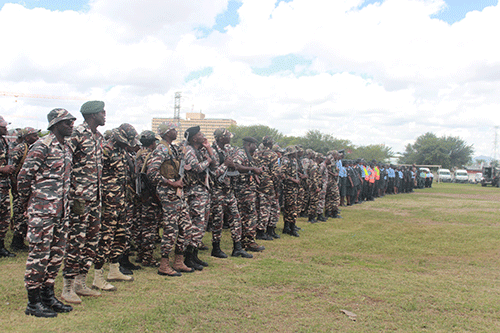Little upgrading and maintenance of military installations inherited from the apartheid regime countrywide has left properties in a dilapidated state.
A regional visit by a parliamentary standing committee on legal affairs noted with concern that some local companies contracted often produced poor workmanship and disappear without completing the work.
This is contained in a report tabled and motivated by National Council member John Likando, who is chairperson of the Standing Committee on Home Affairs, Security, Constitutional and Legal Affairs to the oversight visits to capital projects of the various military bases in the selected regions. “It was noted with great concern that most of the military bases visited were inherited from the old regime, and since then there were no major rehabilitations nor renovations done to these infrastructures as a result the structures are in bad status and need attention as a matter of urgency,” Likando indicated.
For the purpose of visits, specific construction projects of the Ministry of Defence in the Khomas, //Kharas, Omaheke, Erongo, Otjozondjupa, Kavango East, Zambezi, and Kunene regions as indicated in the committee’s activity plan 2022/2023 were identified.
Likando explained the visit to the regions was in accordance with the 2022/2023 activity plan of the committee which included oversight visits to the NDF military bases facilities that were undergoing renovations, construction, and rehabilitation.
Equally, he said the objective was to assess the progress made and to ensure that government resources are put to good use as per the Medium Term Expenditure Framework (MTEF) for the period 2019/2022.
Capital projects visited at these military bases were at the time undergoing construction, renovations, and rehabilitation, in order to meet the demands of accommodation and office infrastructure for the armed forces countrywide.
The military bases that were visited include Leopard Valley; Keetmanshoop; Karasburg; Gobabis; Walvis Bay Naval base; Rooikop; Karibib Air Force; Otjiwarongo; Rundu; Mpacha Military Base; and Okagwati.
The committee observed the dilapidated runways, with many potholes and cracks at some of these bases.
It was also detected that the runway was short and there was a need for rehabilitation and to extend it from 3kms to 3.5kms for suitable takeoff and landing.
The committee also noticed with great concern the structures are made out of prefabricated materials that have a short life span.
The structures observed at Gobabis military base were in a bad state and requires renovation. Further, the members found poor security or boundary fences and lack of security lights at some military expose military equipment and other material that is not meant to be seen by the public and compromises the country’s security.
The committee noted that the development agenda in terms of capital projects designed for military bases were ongoing around the country but at a slow pace.
This is attributed to the country’s economic downturn that has led to serious budget cuts, negatively affecting capital project funding.
Some projects have been completed and the completion of others was indefinitely deferred.
The committee also discovered that there were shortages of storerooms and that the military arsenal was exposed to harsh conditions.
There was a great concern that there were no hangars at Karibib Air Force base to park their aircraft as a result they were making use of the Grootfontein hangars.
Another factor that halted the implementation of projects was a moratorium issued by the government to put capital projects that were under the 5% completion level on hold.
Other contributing factors noted by the committee were insufficient budgetary allocations to capital projects due to drought and Covid-19.
The committee also visited military bases that did not receive funding for capital projects to ascertain the state of the existing infrastructures and was satisfied. Amongst the noted observations made by the committee was the shortage of land that could curtail the future expansion of the military bases.
–anakale@nepc.com.na


